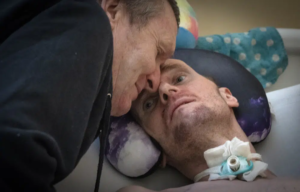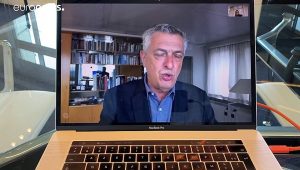In a strong voice tinged with her Irish homeland, Fiona Prine talks hauntingly about loss. From her COVID-19 infection and isolation — self-imposed in hopes of sparing her husband, folk-country legend John Prine — to his own devastating illness and death, she’s had more than her share in this year like no other.
Illness and death are the pandemic’s most feared consequences, but a collective sense of loss is perhaps its most pervasive. Around the world, the pandemic has spread grief by degrees.
While less than 1% of the global population is known to have been infected, few on Earth have been spared some form of loss since the coronavirus took hold. With nearly 1 million deaths worldwide, full-blown bereavement is the most recognizable.
But even smaller losses can leave people feeling empty and unsettled.
Layoffs. Canceled visits with Grandpa. Shuttered restaurants. Closed gyms. These are losses that don’t fit neatly into a “Hallmark category.” But they are not insignificant — especially when anxiety is already heightened, says psychologist and grief specialist Robert Neimeyer of the Portland Institute for Loss and Transition.
Activities that are part of usual routines, that bring pleasure or purpose, give people a sense of control over their lives. Losing them can result in psychological distress and unease, he says.
In normal times, people look to families, friends, communities for support in coping with loss. But in the pandemic, “We don’t have as much capacity as a human community to meet the needs. Nearly everyone has been affected,” he says.
“If you were to approach anyone on the street and ask them 10 times, `What have you lost?’, you would hear some remarkable stories.”
___
By the time John and Fiona Prine returned home from a trip to Ireland in late February, the pandemic was spreading. Soon after, Prine had hip replacement surgery, and they hunkered down in their Nashville home for his recovery.
They’d been careful overseas and came home feeling healthy but cautious. Coronavirus tests were almost an afterthought.
“We were doing fine. Happy to be home. John was already up on his feet with a cane,” Fiona Prine says.
Prine was 73, a cancer survivor with chronic lung disease, but still performing regularly. His wife and manager, 15 years younger, was protective. She often watched from backstage.
“I knew this would not be a safe virus for John,” she says.
When the call came with results showing she’d tested positive, “You might as well have told me I was pregnant,” Fiona Prine says. Hoping to keep her husband healthy, “I literally bolted for the bedroom and locked myself in practically.”




